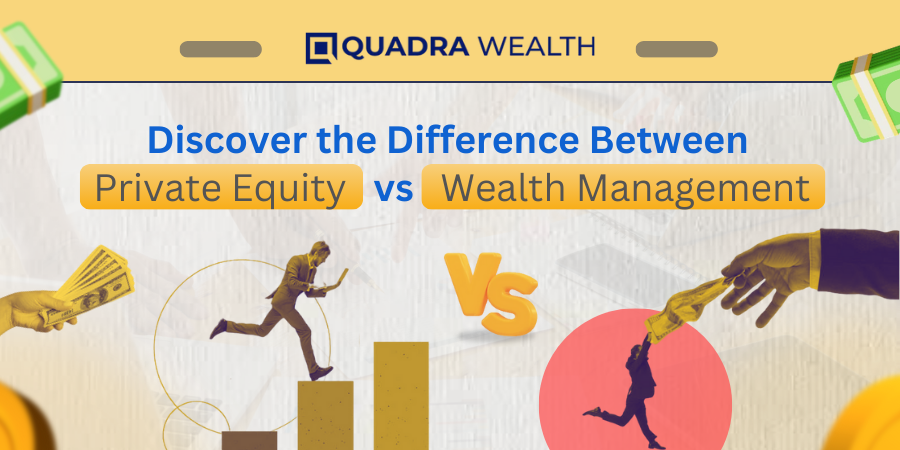Do you find it difficult to decide between private equity and wealth management as a sound investing strategy? Financial experts suggest that the difference between private equity and wealth management lies in their goals and methods.
The below article uncovers the in-depth benefits, as well as drawbacks of both approaches to help you decide which scenario would be the most appropriate for your financial objectives. Are you ready to learn the secrets of wise investing?
Key Takeaways
- Long-term wealth growth and protection is the goal of wealth management. A person or business can make financial plans for their investments, savings, and spending.
- The goal of private equity is to make large profits by purchasing and transforming businesses. Although there is a greater risk, there is also potential for great reward.
- High-net-worth individuals receive financial advice from wealth managers, such as those at Goldman Sachs, regarding personal finance, investments based on securities, asset maintenance, and taking risks with their portfolios.
Understanding Private Equity
Private equity refers to direct investments in private companies or buyouts of publicly traded companies that result in their delisting by providing financial management services. The acquisition, upgrade, and eventual disposal of assets to generate high returns for primary investors is central to Private Equity.
The private equity firm usually leads these efforts, conducting financial forecasting, trend analysis, and in-depth market research as part of its due diligence process before potentially managing and restructuring companies for expansion.
But investing this way comes with a set of drawbacks as well, like a high risk of underperformance because of operational changes or an illiquid investment horizon that prospective investors need to completely understand.
Pro Tip: Technology has not only made internal procedures and decision-making skills within PE firms better, but it has also made access to various asset classes more accessible. Real-time insights into venture capital investments or hedge funds managed by sophisticated platforms with intelligent analytics are beneficial to investors.
Pros and Cons of Private Equity
Advantages of Private Equity
Personalized Service
For individualized care and guidance, many wealthy people turn to private banking, a subset of wealth management.
Scope of Return
Private equity investments can provide substantial returns for patient investors over a three to ten-year period.
Investment Opportunities
Investing in private equity gives one access to hands-on investment possibilities not found in public markets. This covers pivotal financial investments in startups, early-stage businesses, and businesses going through major transitions. Opportunities like these don’t usually present themselves in publicly traded companies but can offer significant upside potential compared to traditional private banking options.
Long-term Involvement
Since private equity investments are usually held for several years, a long-term strategic approach is possible. The company can pursue growth and development initiatives with this long-term focus, free from the short-term pressures that public companies frequently experience from quarterly earnings reports and market expectations.
Disadvantages of Private Equity
Risk Involved
The focus of private equity investments is on underperforming businesses, which carry a higher risk of loss. Private equity is a potentially volatile and unpredictable investment option because its success primarily depends on the performance of the individual companies in which an investor has invested.
Illiquidity
Investments in private equity are significantly known for lack of liquid. In contrast to publicly traded stocks, which are bought and sold on exchanges, private equity investments typically involve a lengthy capital lockup period of several years. A major drawback for investors who need to access their money is this illiquidity.
Complexity
A thorough understanding of the target company and extensive due diligence are necessary for private equity investments. For individual investors, this complexity can be challenging and time-consuming. The thoroughness of this process is essential to meeting the client’s investment goals and ensuring success.
Understanding Wealth Management
Wealth management is a premium financial service that includes estate planning, accounting, tax preparation, retirement planning, legal advice, and investment guidance for a single payment. Usually, it’s designed for people who have a lot of assets to manage.
Rather than having separate asset managers handle stocks, bonds, mutual funds, and other investment kinds, wealth management brings together these services under a single roof. To increase long-term wealth is a straightforward strategy of wealth management.
However, before making an investment decision, you should be aware of the advantages and disadvantages of asset management. Achieving financial goals while limiting risk to a person’s comfort level is always the aim.
Suggested Reads: What Is Asset Allocation And Its Types?
Pros and Cons of Wealth Management
Advantages Of Wealth Management
Fiduciary Guidance
Working with a licensed fiduciary means that the person you deal with has a legal duty to operate in your best interests. To ensure that your needs are prioritized when creating a financial plan, you must work with a fiduciary financial advisor for risk management and to manage your assets.
Fee-Only Service
Has the question, “Are wealth management fees worth it?” ever crossed your mind? You won’t ever have to worry about an advisor attempting to sell a product on you to get paid a commission when you work with a fee-only firm. Fee-only companies usually charge an hourly or flat rate or a percentage of the value of your assets under management.
Industry Credentials
Look for a financial advisor who is a Certified Financial Planner (CFP) approved at all times. This certification guarantees that the advisor is held to the highest ethical standards, has at least a bachelor’s degree under their belt, and has practical experience in the field.
Specific Expertise
Some customers would rather deal with financial advisors who serve similar customers. If you’re an attorney, for instance, you might want to look for an advisor who specializes in working with lawyers. As an alternative, you could focus your search on a particular niche, like real estate or tax-efficient investing.
Disadvantages Of Wealth Management
Anticipated Returns
Wealth management usually does not yield as high of a return as private equity investments, despite its flexibility and liquidity.
Diversification
Diversification often yields lower returns than more aggressive strategies like private equity, even though it can help manage risk.
Costs Involved
For certain investors, the individualized attention provided by private banking is unaffordable due to its high cost.
Commission based fees
You must be aware that any financial product advice you receive is appropriate for you and free of any conflicts of interest. Being cautious of financial advisors who receive commissions for their services is the only way to be certain. Always enquire about your advisor’s payment source.
Difference Between Private Equity vs Wealth Management
While both wealth management and private equity are important areas of the financial industry, their goals and target audiences are different. Below is a summary of their main distinctions:
| Private Equity | Wealth Management | |
| Definition | Investing in private businesses or acquiring publicly traded companies to remove them from stock exchanges are a few instances of private equity. The goal is to restructure, grow, and ultimately sell these businesses for a profit. | Wealth management is a comprehensive service that involves overseeing an individual’s or family’s financial assets, such as investments, estate planning, tax planning, and retirement plans. |
| Investment Focus | Private equity investment firms generally target particular sectors or industries and seek significant returns over a longer period (often five to ten years) when they make investments. | Based on their client’s financial objectives, risk tolerance, and time horizon, wealth managers develop customized investment plans that frequently include a diverse portfolio of stocks, bonds, and alternative investments. |
| Client Base | High-net-worth individuals and institutional investors, such as pension funds, endowments, and family offices, are the main investors in private equity funds. | Private Wealth Management services offer individualized financial planning and advice, primarily to high-net-worth individuals and families. |
| Structure | Through funds, which are closed-end and have a set duration, private equity firms raise capital. For the term of the fund, investors commit their capital, and the firm receives a management fee and a portion of the profits (carried interest). | Offerings for wealth management can come from independent businesses, banks, or financial advisors. Assets under management (AUM), hourly rates, or flat fees may be used as the basis for fees. |
| Risk and Return | Compared to traditional investments, private equity has the potential to yield higher returns, but it also carries greater risk and is frequently illiquid. | In order to meet the financial goals of the client, wealth management usually takes a more conservative approach, aiming for steady growth and capital preservation. |
The Role of Private Equity in Wealth Management
A key component of strategic financial planning is private equity (PE). In comparison to traditional investments, private equity can offer investors a favorable diversification strategy and the possibility of long-term growth.
Balancing Investment Holdings with Private Equity
Wealth managers frequently advise wealthy investors to include private equity in their portfolios. Clients can access opportunities not correlated with the volatility typically found in stock exchanges by investing in companies that are not listed on public markets. By using this strategy, portfolios are positioned for long-term, significant returns while also improving risk management.
Investors turn to private equity wealth management firms because they provide extensive market expertise as well as connections to identify promising ventures before they become widely known. Such insights provide early entry points into potentially lucrative opportunities in technology, healthcare, and consumer goods.
Private equity can provide wealth strategies that go beyond simple capital gains. By holding positions on boards of directors or other prominent positions, it enables investors to actively participate in portfolio companies. More control over their financial future is provided by this active approach than by passive stock market investments.
Strategies for Incorporating Private Equity into Wealth Management
Businesses that handle substantial personal wealth utilize advanced techniques based on each client’s objectives and risk tolerance. Every strategy, which ranges from direct company buyouts to fund-of-funds arrangements that group several PE funds under one umbrella, has advantages specific to the needs of various investor types considering either aggressive or conservative growth strategies for their holdings.
This dynamic interplay between opportunity spotting and prudent financing models can be seen by growth equity investments, a subset of private equity that focuses on mature startups poised for rapid expansion without taking on too much debt leverage. This aspect is becoming more and more appealing to identifying clientele eager to outperform traditional asset classes while effectively mitigating downside risks during turbulent times.
A lot of wealth-seeking investors have come to understand how critical it is to incorporate private equity into their investment strategies. Knowing how private equity investment strategies can enhance other assets by offering diversity and possibly higher returns is crucial.
Related: Understanding The Benefits Of Alternative Investment Funds
Private Equity and Wealth Management Services: Which is Better?
Both private equity and private wealth management provide substantial outcomes and have advantages. Through prudent wealth management, your wealth can increase over time. You receive advice on how to allocate your funds in different places like stocks, bonds, and real estate.
In this way, the risk is reduced.
That is not the case with private equity. It deals with purchasing all or a portion of a business and then assisting it in growing. Although it might take several years, the process aims to achieve major growth.
Because all of the cash is concentrated in one location, there is greater control but also greater risk.
So, which one is better?
Depending on your role in the financial world, this will vary. Consider wealth management if you enjoy having a variety of investments, consistent growth, and a long-term commitment. Select private equity if you like to take calculated chances in exchange for large returns and don’t mind waiting for them.
The Bottom Line
In summary, your risk tolerance and financial objectives will determine which option you prefer between wealth management and private equity. For long-term income stability, wealth management provides consistent growth and diversification across various types of investments.
On the other hand, investors seeking to engage in hands-on business operations and take measured risks in exchange for possibly large returns would be well-suited for private equity. High-net-worth individuals can benefit from both options, which include private banking services; however, the best option will depend on the preference of the client for an aggressive or conservative approach to wealth growth.










